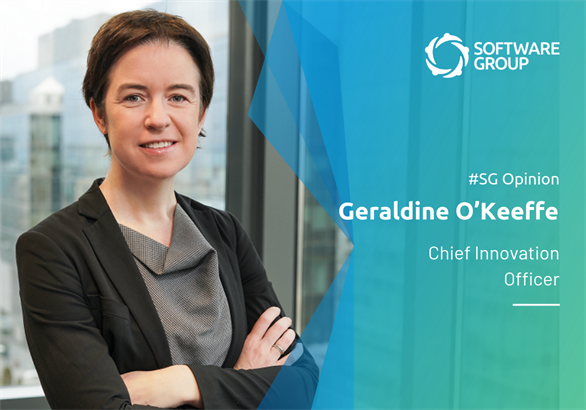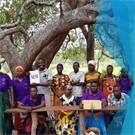Myanmar Financial Services Monitor spoke with Software Group’s Chief Innovation Officer Geraldine O’Keeffe about the company’s experience in Myanmar and wider digitalisation in the microfinance sector.
The company serves a global client base in more than 70 countries from nine regional offices. Software Group has been working in Myanmar for the last few years, starting with Fullerton Myanmar and most recently with Early Dawn Microfinance Company Limited (“DAWN”).
Our operations in the country are supported from the APAC office of the company in Manila, in the Philippines.
With this initiative, the financial institution aimed to lower its cost of banking and to make banking available over mobile channels. Fullerton aims to extend financial inclusion to remote areas of Myanmar.
The project started when Fullerton was beginning to establish itself, so we managed to gain experience with a series of new local regulations over the years, not only in accounting and interest rates but also in cloud hosting, data centers location, etc. It ensured that our first experience in Myanmar provided a useful learning curve and helped us understand the market better.
Regarding our other client DAWN, our story with them started with Accion Microfinance Bank, with whom we have a long history working in several different institutions. DAWN and Accion are strategic partners, so when they began looking for solutions to digitise their operations, they sent us an RFP that we responded to.
DAWN is using a different core banking system – Kredits which we had experience with in the past, but this was the first time that we were working on an integration to this system. The process required close collaboration with Kredits and with DAWN in order to ensure that the solution works seamlessly.
Software Group’s team went onsite for a scoping exercise to evaluate exactly how our Digital Field Application (DFA) solution will work in their business context. We have since signed an agreement with DAWN and the project is in progress.
We are currently putting together the functional specification document and already looking forward to moving forward and leveraging the technology to support DAWN with their business goals.
The reason is that most core banking systems have a set number of parameters about how to calculate interest - daily interest, flat interest etc. I have worked in microfinance for 17 years, and it still amazes me how many creative ways there are to calculate interest. Myanmar came up with another way we had not seen at that time.
Here we need to mention also the role of Temenos T24 because it has a functionality called “local development” that allows to make those changes. The system does not require to go back to Temenos and ask for changes, the implementation team can make the alternation by themselves.
Regarding the interest, it is very important when you make a loan to think about what happens if the payments are done too early, too late, or if they are delayed.
Everything needs to be taken into account. Hence, our task was to understand the requirements very carefully, which required working intensively with local regulators and accountants, going through local development, performing the necessary testing, etc. Interest equals income, so we had to make sure calculations work perfectly while the regulator was following the operations very closely.
Another challenge during the project was the language barrier. Initially we handled the project by sending a team from Kenya to Myanmar and then performing all the trainings through local translators. At that stage, Fullerton did not have the plan to translate the front-end interface. Hence, we had to train the staff to use the system almost by memory - for example, four fields down is the customer name field, etc.
In almost each part of our project, there were tasks that we had to do for the first time. It was challenging but at the same time a great opportunity to gain experience and know-how on the market. Despite all that we made it happen and got the system up and running within the set time frame.
This is one of the reasons why we now have customers such as DAWN and also others that understand the need for the technology and how it will help them to leverage their businesses. Technology helps financial institutions service their customers better, reduce the amount of paper and manual work used.
DAWN collects a huge amount of financial information about their customers but they only capture a small amount of that in their core banking system. So, the question is what happens to the rest of the data? With the DFA solution, the aim is to capture all of the data and build up a comprehensive and detailed history of customers that allows more accurate forecasting and analysis.
This results in a higher quality, better performing portfolio and allows an increased caseload for loan officers, redeploying data entry staff to more productive tasks, improving customer experiences. There are a lot of strong business drivers behind the move and the financial institutions realize this.
Some clients have a concern regarding the customer data that is collected on the tablet and what happens if it is lost or stolen in the field. When we talk about efficiency improvements, we always face the mindset that jobs will be potentially cut. Overall, I believe that the upfront cost and the change in management are some of the major considerations that can affect the decisions to proceed further with a DFA implementation.
Examples of such building blocks can be functionalities for customer origination or financial transactions. We use these blocks to create solutions such as DFA. I would like to share an example with a client in Cambodia that has a DFA solution but also they have field tellers, which is an equivalent of agency banking. In their case, we added another building block to allow staff to perform the cash-in/cash-out transactions for agency banking.
We come from a financial inclusion background, and the founders of Software Group have spent over 17 years in that industry. We have observed the trends in the sector and we can see that they are currently shifting. There are mobile money companies targeting the bottom of the pyramid with products such as micro-insurance, banks going in the financial inclusion sector, and MFIs going through digital transformation.
Software Group works with a whole range of institutions - banks, MFIs, credit unions in which we are implementing shared platforms that help these providers to introduce digital services for their clients. We accelerate financial inclusion and at the same time support further financial institutions in improving their operational efficiency, customer services and introducing new digital products.
The continuous interation and engagement highlights overlaps. As long as there is clear communication and governance structure in place, the partnership can still work.
We have a payment switch product that is basically an entry level switching solution for financial institutions getting into cards for the first time. Agency Banking, mWallet and Enterprise Integration Platform are also part of our main offering for the local market.
Our strategy is to increase focus and approach more commercial banks. We are partnering with big tech companies in Myanmar which support us in developing further Software Group’s positioning on the market.
We can see that Myanmar is developing quickly and there is a lot of potential for digital channels such as agency banking or mobile wallets. Hence, we plan to continue our work there and help more financial institutions to digitize and improve their operations.
Could you tell us a bit about Software Group and your business?
Software Group is a global technology company specialized in digitalization and integration solutions for institutions that provide financial services. These include solutions such as mobile banking, ATMs, mobile wallet, digital field application etc.The company serves a global client base in more than 70 countries from nine regional offices. Software Group has been working in Myanmar for the last few years, starting with Fullerton Myanmar and most recently with Early Dawn Microfinance Company Limited (“DAWN”).
Our operations in the country are supported from the APAC office of the company in Manila, in the Philippines.
Can you talk about the specifics of how you came to work with those two financial institutions?
We started working with Fullerton Myanmar through our partnership with Temenos, a global core banking system provider. It has a product offering based on its core banking system T24 that caters especially to emerging markets. In partnership with Temenos, we signed up an agreement with Fullerton for a five-year project that included implementation of T24 on the cloud as well as rolling out a Digital Field Application (DFA) for loan officers that is used on tablets.With this initiative, the financial institution aimed to lower its cost of banking and to make banking available over mobile channels. Fullerton aims to extend financial inclusion to remote areas of Myanmar.
The project started when Fullerton was beginning to establish itself, so we managed to gain experience with a series of new local regulations over the years, not only in accounting and interest rates but also in cloud hosting, data centers location, etc. It ensured that our first experience in Myanmar provided a useful learning curve and helped us understand the market better.
Regarding our other client DAWN, our story with them started with Accion Microfinance Bank, with whom we have a long history working in several different institutions. DAWN and Accion are strategic partners, so when they began looking for solutions to digitise their operations, they sent us an RFP that we responded to.
DAWN is using a different core banking system – Kredits which we had experience with in the past, but this was the first time that we were working on an integration to this system. The process required close collaboration with Kredits and with DAWN in order to ensure that the solution works seamlessly.
Software Group’s team went onsite for a scoping exercise to evaluate exactly how our Digital Field Application (DFA) solution will work in their business context. We have since signed an agreement with DAWN and the project is in progress.
We are currently putting together the functional specification document and already looking forward to moving forward and leveraging the technology to support DAWN with their business goals.
You mentioned the learning process of working with Fullerton in Myanmar for the first time. Can you share some of the lessons?
The experience helped us understand the market better and the needs of the financial institutions in Myanmar. For example, interest accruals and accounting needed a lot of customization. Fullerton had a very ambitious timeframe and we had to change the interest calculations for a short period of time in spite of being a sensitive area in the core banking systems.The reason is that most core banking systems have a set number of parameters about how to calculate interest - daily interest, flat interest etc. I have worked in microfinance for 17 years, and it still amazes me how many creative ways there are to calculate interest. Myanmar came up with another way we had not seen at that time.
Here we need to mention also the role of Temenos T24 because it has a functionality called “local development” that allows to make those changes. The system does not require to go back to Temenos and ask for changes, the implementation team can make the alternation by themselves.
Regarding the interest, it is very important when you make a loan to think about what happens if the payments are done too early, too late, or if they are delayed.
Everything needs to be taken into account. Hence, our task was to understand the requirements very carefully, which required working intensively with local regulators and accountants, going through local development, performing the necessary testing, etc. Interest equals income, so we had to make sure calculations work perfectly while the regulator was following the operations very closely.
Another challenge during the project was the language barrier. Initially we handled the project by sending a team from Kenya to Myanmar and then performing all the trainings through local translators. At that stage, Fullerton did not have the plan to translate the front-end interface. Hence, we had to train the staff to use the system almost by memory - for example, four fields down is the customer name field, etc.
In almost each part of our project, there were tasks that we had to do for the first time. It was challenging but at the same time a great opportunity to gain experience and know-how on the market. Despite all that we made it happen and got the system up and running within the set time frame.
What about your other customer DAWN? Could you please share more about the case?
We had worked with Accion before, and one of our projects was a study on Digital Field Applications (DFA) that we did together almost five years ago. At that point, Accion had not become aware of the benefits of using tablet applications by their loan officers. Slowly and gradually during the past years, MFIs have realized the impact of tablets on their operations and efficiencies.This is one of the reasons why we now have customers such as DAWN and also others that understand the need for the technology and how it will help them to leverage their businesses. Technology helps financial institutions service their customers better, reduce the amount of paper and manual work used.
DAWN collects a huge amount of financial information about their customers but they only capture a small amount of that in their core banking system. So, the question is what happens to the rest of the data? With the DFA solution, the aim is to capture all of the data and build up a comprehensive and detailed history of customers that allows more accurate forecasting and analysis.
This results in a higher quality, better performing portfolio and allows an increased caseload for loan officers, redeploying data entry staff to more productive tasks, improving customer experiences. There are a lot of strong business drivers behind the move and the financial institutions realize this.
What are the considerations clients take into account before implementing DFA?
We have clients, in India for example, who have 7000 loan officers and the cost of purchasing tablets for them would be significant. Digital security is another topic that comes in the discussions when we talk about the DFA solution. Our applications can work in an offline mode so they are very relevant in countries with poor connectivity.Some clients have a concern regarding the customer data that is collected on the tablet and what happens if it is lost or stolen in the field. When we talk about efficiency improvements, we always face the mindset that jobs will be potentially cut. Overall, I believe that the upfront cost and the change in management are some of the major considerations that can affect the decisions to proceed further with a DFA implementation.
Tell us more about the approach of Software Group in DFA implementation.
Some core banking systems do have their own DFA but this is not the case for all. Nowadays, it is a norm that core banking providers need to be able to ensure application programming interfaces (API) for integration. This has become a standard feature. Following the global trends in the sector, Software Group changed its strategy three years ago shifting from a solution-based to a platform-based model. Our core technology offering is an omni-channel digital banking platform which has a core set of functionalities and building blocks.Examples of such building blocks can be functionalities for customer origination or financial transactions. We use these blocks to create solutions such as DFA. I would like to share an example with a client in Cambodia that has a DFA solution but also they have field tellers, which is an equivalent of agency banking. In their case, we added another building block to allow staff to perform the cash-in/cash-out transactions for agency banking.
We come from a financial inclusion background, and the founders of Software Group have spent over 17 years in that industry. We have observed the trends in the sector and we can see that they are currently shifting. There are mobile money companies targeting the bottom of the pyramid with products such as micro-insurance, banks going in the financial inclusion sector, and MFIs going through digital transformation.
Software Group works with a whole range of institutions - banks, MFIs, credit unions in which we are implementing shared platforms that help these providers to introduce digital services for their clients. We accelerate financial inclusion and at the same time support further financial institutions in improving their operational efficiency, customer services and introducing new digital products.
From your practice do you have cases in competing with Core Banking Software (CBS) vendors?
Unfortunately, this is a very real concern and it’s bound to happen. All companies are realising that they have to compete in order to survive on the market. Some core banking systems are deciding to partner with channel providers like Software Group, others are refusing because they want to offer the channels by themselves.The continuous interation and engagement highlights overlaps. As long as there is clear communication and governance structure in place, the partnership can still work.
Are you looking to diversify the type of clients you have in Myanmar?
We’re looking for financial service providers that are actively going through digital transformation. Our Agency Banking, Mobile Wallet, Enterprise Integration Platform and Payment Switch solutions are of much interest to banks. Furthermore, banks looking at more inclusive finance strategies are an area of interest.We have a payment switch product that is basically an entry level switching solution for financial institutions getting into cards for the first time. Agency Banking, mWallet and Enterprise Integration Platform are also part of our main offering for the local market.
What do you think are the motivations of banks going specifically in the financial inclusion segment?
It differs from bank to bank. When banks want to service the underserved they are going into uncharted waters. We are doing a project in Egypt - which similar to Myanmar has very low financial inclusion - with a retail bank that is working on a mobile wallet. In the project we face the lack of formal ID, online/offline issues, financial literacy - lots of things a company has to think about if it is penetrating a particular market segment.Our strategy is to increase focus and approach more commercial banks. We are partnering with big tech companies in Myanmar which support us in developing further Software Group’s positioning on the market.
We can see that Myanmar is developing quickly and there is a lot of potential for digital channels such as agency banking or mobile wallets. Hence, we plan to continue our work there and help more financial institutions to digitize and improve their operations.






